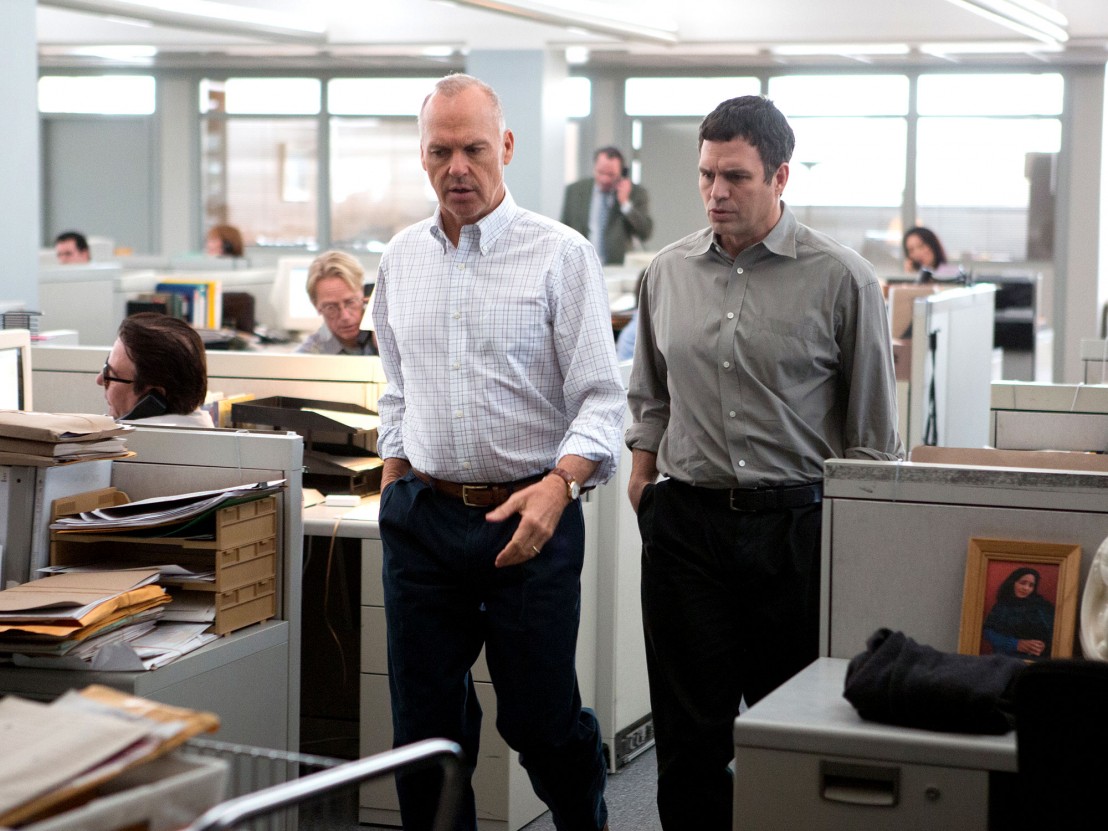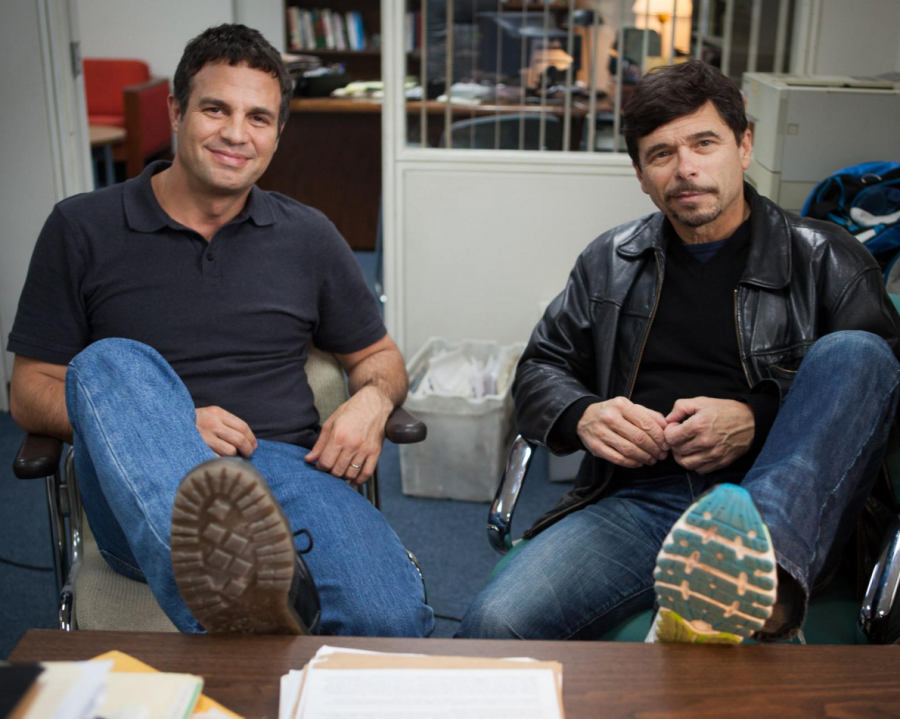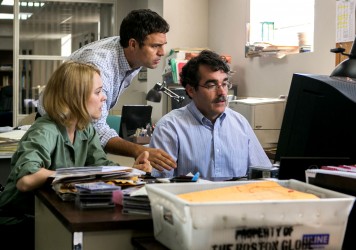
The films that affect us the most work on a narrative level and a much deeper level. Spotlight, directed by Tom McCarthy, is a story about storytelling that salutes its subjects by mimicking their crafting skills, in the process inspiring my own desire to learn by gleaming example. To be more literal, Spotlight focuses on the eponymous investigative journalism team at The Boston Globe and how, in 2002, they exposed the Catholic Church’s complicit silence in hundreds of cases of child sex abuse within the Boston Archdiocese. The deeply researched article, ‘Church allowed abuse by priest for years’, and its numerous follow-ups caused public scandal, legal redress for the victims and won the 2003 Pulitzer Prize.
I saw Spotlight in November 2015. Director Tom McCarthy, writer Josh Singer and actor Stanley Tucci were in attendance, as was Mark Ruffalo via satellite link-up – his big amiable face filling the massive screen. There were two other guests: journalists Mike Rezendes and Sacha Pfeiffer, played in the film by Ruffalo and Rachel McAdams. For the first time since forever, journalists were more magnetic to me than movie stars. Primed by having seen their meticulous truth-seeking in dramatic film form, I couldn’t take my eyes off them.
Their contributions to the discussion implied a wealth of knowledge upholding the carefully chosen words of the surface. Eyes twinkled. Passion was evident but in-check. I was exhilarated to soak up the presence of people who had trained themselves to seek socially beneficial truths. Here were two people who had faced up to the horror and sorrows of child sex abuse, via the medium of truthful storytelling, and in doing so made a genuine, tangible difference.
After the screening, I intercepted Mike Rezendes (this felt particularly fitting given that I had just watched his on-screen persona intercept many people in the name of journalism). The film’s depiction of individuals determined to avoid taking responsibility for their part in a grotesque crime struck me as unpleasantly relatable, so I asked Mike: ‘How do you live without being in denial?’ He passed on a quote that had been passed on to him: “Tell the truth without fear or favour.”
These words felt like the way forward. They stayed with me on the tube home as I brainstormed different ways I could cover Spotlight. The simplest answer felt the most meaningful: talk to Rezendes about the way he tells truthful stories. Rezendes had given me his card at the screening, so I reached out to him and he agreed to meet up the next time he was in town.
First, the facts. He tells me he was born to a home-maker mother and a city government employee father in Bangor, Maine. What year? “I don’t remember,” he says in convincing deadpan. He doesn’t remember what years he spent studying at Boston University as an English major, either. Precise recall kicks in regarding his first newspaper gig. East Boston Community News was where it all began – he was a volunteer reporter for two years while studying, and was promoted to editor immediately after graduating where he stayed for another two years. Pride for the paper’s work and the values it stood for is forthcoming: “It was a non-profit organisation and we considered it our mission to fight for social and economic justice for people in this neighbourhood. It was a very low-income part of Boston, right near the airport.”
Right from the word go, Rezendes showed a clear desire to harness journalistic skills to campaign for social justice. I wonder where this came from. Not his parents, he says. The source of his moral fibre was not something he had given much thought to before he started talking about Spotlight. Now he has come to the conclusion that the organisation that made his name through its vices also forged his virtues. “The Catholic Church, as I was introduced to it, was an organisation that fought for the poor. The life of Jesus is a life of really advocating for the voiceless.”
After the East Boston Community News, Rezendes cobbled together a freelance existence taking assignments from The Real Paper, Boston Phoenix, The Boston Globe and The Boston Herald while also copy-editing for the latter title. He had a staff job at The Boston Phoenix before he switched coasts to work at the San Jose Mercury News in California. Last stop before bedding down at The Globe in 1989 was The Washington Post – always nice to have that one on your resume.
“That is my least favourite part of interviewing, just going through facts,” I say. “Well you have to get the facts right so that’s fine,” responds Rezendes, which makes me feel good, like I am abiding by some journalists’ code. Realistically, he probably said that just to put me at ease. Unlike the stereotypical image of a newspaper journalist as a jaded hack, Rezendes appears to like people and have time for them.

Later on in our interview he goes on to sing the praises of appreciating what everyone has to say. It’s in relation to information-gathering but might as well be advice for all social life. “It’s good to be open-minded and open to different points of view that you might not have considered. I think if someone comes in and they’re very passionate about what they’re saying and they’re expressing a point of view that you haven’t considered or thought about, sometimes you just want to listen to what they have to say – and maybe it’s something you want to factor into your reporting or the way you feel about a particular issue.”
It’s kind of touching to observe that dealing in stories of the worst in human behaviour hasn’t stopped Rezendes from being open to new people and new ideas. When Spotlight’s producers, Blye Faust and Nicole Rocklin, turned up in 2008 asking for an option on the team’s life rights to enable the movie adaptation, Rezendes recalls that while the choice wasn’t easy for all of his colleagues, it was easy for him. “They seemed very sincere and very hard-working. Ultimately we trusted them and thought we would let them have a go at it.”
He is totally supportive of the finished product. “I love this movie for two reasons. One, it shows people how important investigative reporting is, and the other thing is it keeps the spotlight, so to speak, on the issue of clergy sex abuse.” I try to draw out a delicious nugget regarding changes or omissions but quibbling isn’t on the bill. “The film is remarkably true to the spirit of what we did and the substance of what we did. There’s no significant omissions. They hit all the right notes.”
Spotlight is set only 15 years ago and yet the tools of journalism have transformed thanks to the digital revolution. Rezendes, who still works for Spotlight, receives an abundance of emails and phone calls from people who want him to investigate their cases. Choosing which ones to pursue and which ones to let go may be the hardest part of the job, he says, before explaining his decision-making process in illuminating detail. “I don’t do stories that affect just one person or one family. Usually, if I’m going to do a story about the troubles that a particular individual or a family has had, to my mind, it should be emblematic of a larger problem affecting more people. I look for wrong-doing that is systemic in nature.”
The folding back of a particular cover-up is the arc of the film. Another complex task shown within Spotlight – and essential within Rezendes – is the ability to balance interest in a story with a rational analysis of whether he can “nail it to the ground” with facts. “What I try to learn as quickly as I can is not only, ‘Is this a good story?’ but,‘Can I get the story?’ That usually means, ‘Can I get documents that will prove that what I believe is happening is actually happening?’ or ‘Can I get people in positions of knowledge, positions of authority, who will say on the record what’s happening?’ If I think that the chances are less than 50-50 – that I’m not going to be able to get the documents I need – then even though I might believe in my heart that it’s an important story, a great story, I’ll move on to something else.”
The charisma and bullshit of people in positions of power has always struck me as an overwhelming roadblock to uprooting buried truths. Rezendes says that bullshit can be circumvented via a strategic approach. “When I’m doing a story and I might be targeting a certain person, I’ll interview that person last. The way I know whether that person is telling the truth or not is because I’ve already done my reporting and I already know what the facts are and I just want that person to explain it or justify it, usually something like that.”
Charisma, however, is a stickier wicket. “Charisma is very powerful and particularly when you’re dealing with elected officials, some of them are very, very charismatic and very, very charming. Reporters can be very susceptible to that and I think, honestly, I was susceptible to that when I was younger and less experienced. It’s something for any reporter to be cautious about. I don’t think cynicism is ever warranted but it’s good to be sceptical, if you understand the difference. It’s never a wise policy to take at face value what people in positions of power or authority say to you. You have to remember that your primary responsibility is to question authority.”
What is currently under investigation by the Spotlight team? “I’m working on an investigation of gaps in the mental health care system,” Rezendes reveals. “We have a terrible mental health care system in the United States, particularly when it comes to people who are very seriously mentally ill, with disorders like schizophrenia and severe delusional disease. Our mental health care system has deteriorated to a dangerous point.”
I want to find out more but respect the terms of Spotlight’s confidentiality. I want to go into more depth about everything and find out what Rezendes expects upon publishing a massive investigative report and whether he can let go of the stories he tells. I want to know how it affects him to know that priests are still abusing children and if he can carefully delineate the problems within one city from the problems of the whole world. I use our brief time together to ask about the tools of truthful storytelling eschewing my usual fascination with how an interviewee feels about their lives. I wonder how it would have been if I had tried to draw him out – would it have been futile, like playing a player? Or would it have been magnificent?
Our jobs are different in many ways. He writes himself out of stories that expose wrong-doers, I write myself into stories that highlight right-doers. There is still a rich parcel of values that I can turn inward: his reverence for facts and trust in the goodness of people, his focus on choosing the right words and willingness to listen. Oh and there was one more piece of wisdom: “Ultimately you have to synthesise everything you’ve heard and try to make it coherent. That’s not always easy but that’s the job.” Synthesis is not always easy because it is the opposite of camping inside your own instinctive beliefs. Synthesis requires you to be sufficiently attached to listen to your sources while detached enough to think independently. Synthesis is difficult because information is never-ending and it is a kind of miracle when people make poignant sense of such a formless mass. I dare to hope that I can follow in the footsteps of the movie Spotlight, which followed in the footsteps of Mike Rezendes and colleagues, and that our values will become one.
Published 27 Jan 2016

Tom McCarthy delivers an old-school journalistic thriller with the help of a sensational all-star cast.

Love You To Death immerses the viewer in the powerful and revealing stories of bereaved families and friends.

It’s possible for a movie to have a positive impact on society and the individual.